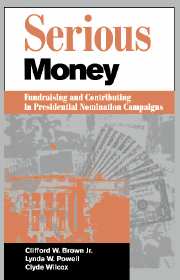Book contents
- Frontmatter
- Contents
- List of figures and tables
- Acknowledgments
- 1 Introduction
- 2 The regulatory environment
- 3 The contributor pool
- 4 Mobilizing the pool: Methods of soliciting campaign funds
- 5 Candidate resources
- 6 Recruiting contributors and solicitors: Candidate and individual decisions
- 7 Conclusion
- Appendix I The 1988 and 1992 presidential nomination surveys
- Appendix II 1988 and 1992 survey items used in the analysis
- Notes
- Bibliography
- Index
1 - Introduction
Published online by Cambridge University Press: 27 August 2009
- Frontmatter
- Contents
- List of figures and tables
- Acknowledgments
- 1 Introduction
- 2 The regulatory environment
- 3 The contributor pool
- 4 Mobilizing the pool: Methods of soliciting campaign funds
- 5 Candidate resources
- 6 Recruiting contributors and solicitors: Candidate and individual decisions
- 7 Conclusion
- Appendix I The 1988 and 1992 presidential nomination surveys
- Appendix II 1988 and 1992 survey items used in the analysis
- Notes
- Bibliography
- Index
Summary
Robert Farmer, a major fundraiser for both Michael Dukakis and Bill Clinton, offered this blunt assessment of Paul Tsongas's decision to quit the 1992 presidential race: “People don't lose campaigns. They run out of money and can't get their planes in the air. That's the reality” (Congressional Quarterly Weekly Report, 1992). Although Tsongas himself may have had several reasons for dropping out, he highlighted finance as one of them: “If you have no resources to fight back with, you are defenseless in this business. … Michael Dukakis had the most money and could take out Dick Gephardt and everybody else, and Bill Clinton basically did the same thing” (“MacNeil/Lehrer Newshour” 1992).
There can be little doubt that money is important: in seven of the eight major-party presidential nomination contests that took place since the current financial rules of engagement went into effect in 1980, the eventual winner had the largest amount of cash in the bank on January 1 when the process started in earnest. Caution, of course, is warranted in assuming a causal connection here. Those who have the most cash reserves at the start of the process (or who eventually raise the most money) do so for a reason, and the political resources that enable candidates to win the nomination may also be those resources that enable them to raise large amounts of money and raise them early. Attractive, viable candidates tend to receive more money as well as more votes.
It is also wrong to assume that just because a candidate raises a lot of money he or she will do well.
- Type
- Chapter
- Information
- Serious MoneyFundraising and Contributing in Presidential Nomination Campaigns, pp. 1 - 13Publisher: Cambridge University PressPrint publication year: 1995



